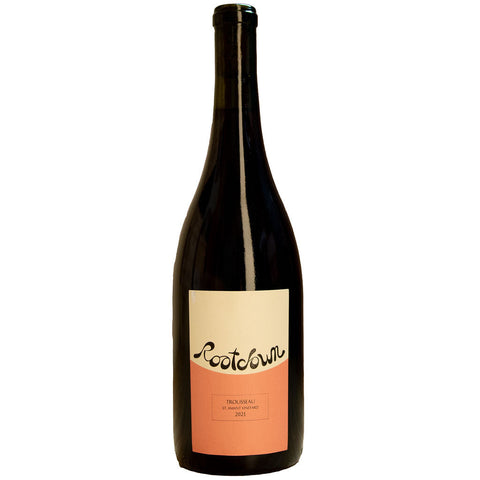
2022 Rootdown Trousseau St. Amant Vineyard, Amador County , California, USA
The nose evokes dusty rose, forest floor, bouquet garni, and raspberry with a palate of juicy raspberry, sour cherry, and pomegranate framed by slate, tarragon, and orange pith. The wine reaches all parts of the palate and concludes with a long finish.
ABOUT THIS WINE
St. Amant was planted in 1972 to ungrafted Zinfandel. Later that decade, a section of this Zinfandel was grafted over to five Portuguese varieties after the owners became interested in Port-style wines. Bastardo (née Trousseau), one of the few Portuguese varieties UC Davis had at the time, was St. Amant’s first Portuguese crop in 1981. After a spell with Phylloxera, a pesky root-chewing louse, they replanted their Port varieties on Phylloxera-resistant rootstock. The 1.8 acres of organically farmed grapes that Rootdown sources in this vineyard were planted in 2004 on Honcut soil (deep, well-drained soil formed into somewhat coarsely textured alluvium from base igneous and granitic rocks) atop floodplains and moderately sloping alluvial fans.
"For the winemaking, I fill small tanks with whole grape clusters (which were harvested in half-ton macrobins) and pump in Co2. The grape clusters remain intact, completely under Co2 for six weeks with no intervention. This tank is completely sealed with only the bottom valve cracked so when pressure builds, liquid escapes, not gas……….Full Carbonic. The other thirty percent of the grapes were destemmed after harvest and fermented in a neutral oak tank with daily pump-overs until dry. I blended the oak-fermented, de-stemmed wine with the other 70% after it finished fermentation 6 weeks later."
ABOUT THIS PRODUCER
Mike Lucia is no newcomer to the Northern California wine scene, as the owner and producer of multiple wine brands including Rootdown, Cole Ranch, and Es Okay. His winemaking roots go all the way back to the early 90s, where as a teenager he began working in the cellar. Since then, he's been busy: studied in the Fresno State Enology program, made wine for Copain, Goldeneye, and consulted for brands with similar mentalities. In 2016, Mike "hit the gas pedal" on Rootdown, increasing both the quantity and varieties of wine he made, stopping once he reached 9 wines. His newest venture, Cole Ranch Vineyard & AVA is testing all of his knowledge, as he studies a unique terroir (the smallest AVA in the US) and pushes to find the best Alpine varietals that will thrive in the Cole Ranch soil and climate.
Mike's Rootdown label refers to the grassroots of winemaking and the downward influence of the soil on wine, particularly in organic winemaking. Rootdown focuses on varietal specific wines from single vineyards that lead with earth and texture, rather than only fruit. Currently, Rootdown is making wines from the more obscure varieties. Yet over the next few years, the brand will begin to focus on Jura-inspired varietals with Cole Ranch as its source. Stylistically, the wines will continue to be low alcohol, high acid, and with a decidedly hands-off approach, allowing the grapes and specific sites to speak for themselves.
A few new projects are in the works -- after Mike acquired the Cole Ranch vineyard and AVA in Mendocino, this estate vineyard will focus on 2 very different brands from the same property. The Cole Ranch brand will focus on old-guard varieties from vines planted in the 1970's (Cab, Merlot, and Riesling), and a new brand called Cole is in the works that will focus on Savoie varieties from the mountainous Alps Region of France (think: Jacquere, Savignin, Mondeuse!) For both labels, Mike will continue to ferment the wines with native yeasts, no new oak, and sulfur ONLY in amounts equal to what is found naturally on the vine. After close to 20 years in the biz, Mike’s skill as a winemaker is finely tuned, but he usually prefers to let curiosity inform what happens with his wines. He is constantly having fun making decisions that he "shouldn’t" make, and always playing with “What if?”
